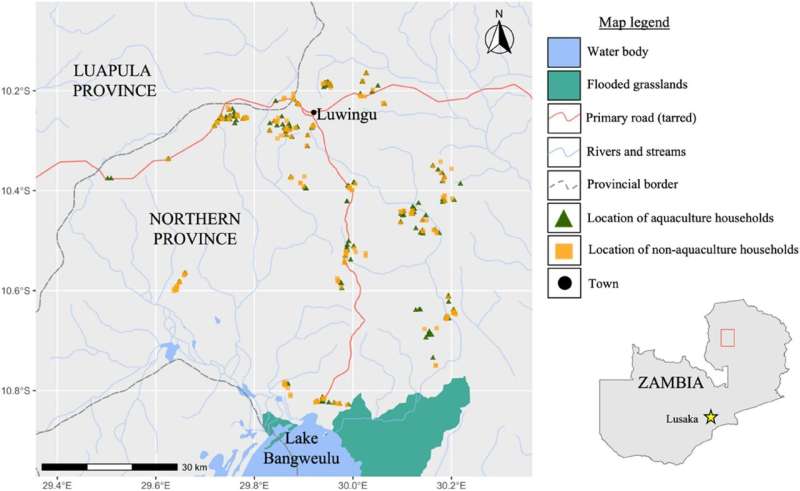This article has been reviewed according to Science X's editorial process and policies. Editors have highlighted the following attributes while ensuring the content's credibility:
fact-checked
trusted source
proofread
New study reveals transformative power of aquaculture in Zambia

A new study led by the University of Stirling has revealed for the first time substantial benefits from adopting smallholder aquaculture for Zambian farmers. The research provides compelling evidence of how fish farming diversifies livelihoods and improves food and nutrition security in rural areas.
Alexander Kaminski, Ph.D. researcher at the University of Stirling's Institute of Aquaculture who undertook the research at WorldFish, said, "Showcasing the role of aquaculture to food and nutrition security of rural homesteads in Africa is a relatively difficult thing to prove.
"For the first time our study in northern Zambia shows that smallholder aquaculture can be a game-changer for local farmers.
"By integrating fish farming into their agricultural practices, households not only diversified their income sources but also significantly improved their dietary variety and overall food security."
The paper, "Smallholder aquaculture diversifies livelihoods and diets thus improving food security status: evidence from northern Zambia," is published in the journal Agriculture and Food Security.
Noticeable enhancement in livelihoods
The research compared households with and without fishponds, demonstrating that those engaging in fish farming experienced a noticeable enhancement in their livelihoods.
These benefits extended beyond mere income generation, leading to a richer, more nutritious diet and a more resilient agricultural system.
The study found that adopting aquaculture gave households two times more likelihood to improve their food security status.
Shakuntala Thilsted, CGIAR Director of Nutrition, Health and Food Security and WorldFish Global Lead for Nutrition and Public Health at the time of the research, said, "This study provides clear evidence that fish farming is an invaluable component in the fight against food and nutrition insecurity in Africa.
"It provides evidence that nutrition-sensitive homestead aquaculture can enrich diets and create sustainable farming systems that benefit entire communities."
Path forward for policymakers
The study's results are significant, showing that food and nutrition security from aquaculture arrives via three pathways, farmers selling fish for money to afford a better diet, eating fish from ponds to have access to high-quality sources of protein and micronutrients, and using the pond within an integrated farming system that allows for diversification into other crops.
The results of this study offer a path forward for policymakers and development agencies looking to improve rural economies and nutrition in developing regions.
It underscores the value of looking beyond traditional agricultural methods and embracing more integrated, diversified farming approaches.
The study recommends that while measuring productivity and profits from ponds is useful, measuring the impact on dietary quality and food security is equally important.
More information: Alexander M. Kaminski et al, Smallholder aquaculture diversifies livelihoods and diets thus improving food security status: evidence from northern Zambia, Agriculture & Food Security (2024). DOI: 10.1186/s40066-023-00452-2
Provided by University of Stirling





















